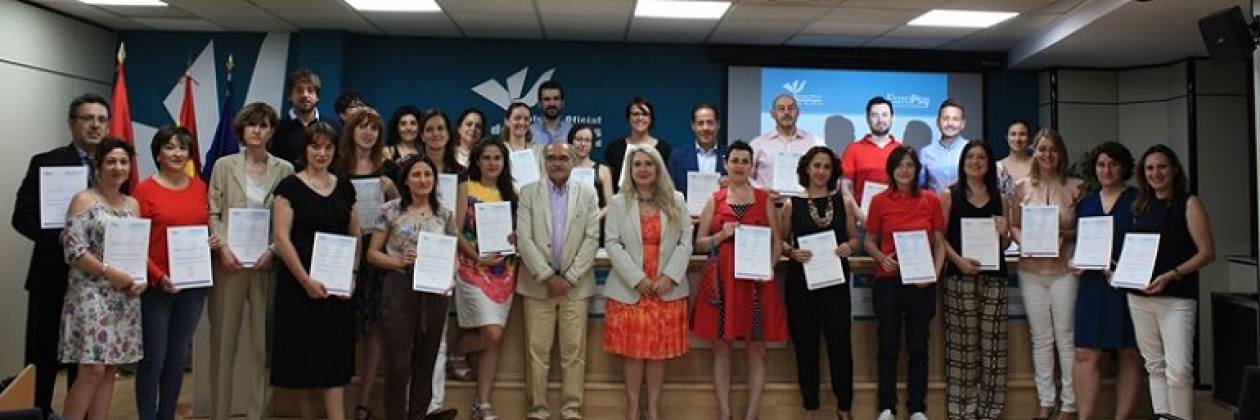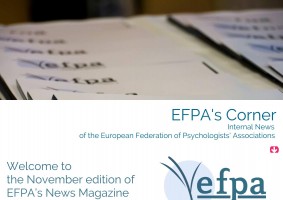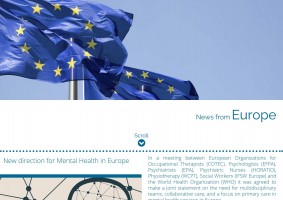Day of Psychology: December 2, 2017 ‘Nächstes Jahr wird alles anders?
(Everything will be different next year - how psychology can help to fulfill the mental wish list)
_w574_h300_1.jpg)
Early Childhood care and Education
VI International Conference - Lemonosov Moscow State University
May 13 - 15, 2017
On May 11-13 2017 the VI International Conference «Early Childhood Care and Education» (ECCE 2017) was held in Lomonosov Moscow State University. Delegates from 25 countries worldwide and 75 regions of Russia participated in the Conference.
The Conference is supported by the Russian Ministry of Science and Education, the Commission of the Russian Federation for UNESCO, the Russian Academy of Education, the Russian Psychological Society and the World Bank.
Every year a Partner Country of the Conference is presenting experience in sphere of child psychology and education. This year USA has become a Partner Country: the conference was officially supported and visited by the President of the American Psychological Association Dr. Antonio Puente and Senior Director of the National Association for the Education of Young Children Stephanie Olmore. During the opening of the conference a MOU between the American Psychological Association and the Russian Psychological Society was signed.
More
Renewal of EuroPsy Certificates from COP Madrid
On June 28, 2017 second promotion of EuroPsy specialist certificate took place in Madrid. Reed the full article (in Spanish) here

The Power/Threat/Meaning Framework:
Beyond Diagnosis to Meaning-based Patterns in Emotional Distress
Presentation at Division of Clinical Psychology Annual Conference,
January 19th, 2017, Liverpool
‘What has happened to you?’ (How is Power operating in your life?)
‘How did it affect you?’ (What kind of Threats does this pose?)
‘What sense did you make of it?’ (What is the Meaning of these experiences to you?)
‘What did you have to do to survive?’ (What kinds of Threat Response are you using?)

Symposium summary
The symposium summarises a DCP–funded project to develop a conceptual alternative to the diagnostic model of mental health difficulties and distress. Members of the project team (leader Lucy Johnstone; deputy leader Mary Boyle; co-authors John Cromby, Jacqui Dillon, Dave Harper, Peter Kinderman, Eleanor Longden, David Pilgrim, John Read, supported by Kate Allsopp) will be present for the discussion.
Over a period of 4 years the team has developed an alternative approach to identifying patterns in distress that draws on evidence about, and synthesises, the causal roles of power, evolved threat responses, social discourses, and personal meanings and narratives. We have named it the Power/Threat/Meaning Framework. It is intended to provide the basis for an ongoing series of developments in clinical practice, service design and commissioning, professional training, research, and service user involvement.
Last year’s symposium described the emerging principles of the work. This year, the speakers will outline the project’s key conclusions and describe the provisional patterns that have been developed as an alternative to diagnostic ones. The Chair/Discussant will then summarise some of the implications and invite feedback and discussion.
Paper 1
Lucy Johnstone, Clinical Psychologist, Independent Practitioner
The role of Power in mental distress
This paper gives a brief summary and overview of the main principles underpinning the Power/Threat/Meaning Framework. Its three interdependent core aspects provide a basis for identifying patterns that arise out of evolved Threat Responses, which are conceived of as survival strategies rather than ‘symptoms.’ Within this, the roles of meaning, narrative and human agency, largely obscured and excluded by psychiatric diagnosis, are central. It is argued that the framework is well placed to accommodate some of the more problematic aspects of existing systems, such as ‘co-morbidity’ and cultural variations.
Drawing on an extensive summary of the literature, it is further argued that these broad, meaning-based patterns are strongly evidence-based. While much work remains to be done, the framework as presented provides a potential solution to the ‘everything causes everything’, ‘everyone has experienced everything’ and ‘everyone suffers from everything’ conundrums that have bedevilled current attempts to move beyond diagnostic clustering, both psychiatric and psychosocial.
Paper 2
Mary Boyle, Professor Emeritus of Clinical Psychology, University of East London
The role of Power in mental distress
This paper focuses on one of the most central aspects of the framework - its detailed attention to the operation of Power, material, social and ideological. It demonstrates how the framework can be used to make visible the links between Power and Threat Responses and thus restore meaning, intelligibility and function to diagnostically-labelled ways of thinking, feeling and behaving. Our proposed ‘Foundational Pattern’ is a compelling evidence-based summary and illustration of the role and impact of Power across all human welfare systems, and suggests radically different approaches to conceptualisation, prevention, support and intervention in mental distress, anomalous experiences and problematic behaviour.
Paper 3
John Cromby, Reader in Psychology, Leicester University
Evidence-based patterns in mental distress
The paper describes some examples of the evidence-based patterns that emerge from the Power/Threat/Meaning framework. These patterns are conceived of as overlapping, contingent and to a degree unpredictable at an individual level, partly because of our human capacity for agency and meaning-making. However, it is argued that they are not random, and can serve as a basis for some of the clustering purposes that diagnosis claims but fails to fulfil. Grouping people’s Threat Responses in terms of function and meaning enables us to cut across traditional psychiatric categories, and drawing on these broad patterns can support the construction of individual narratives. There are many other implications for offering support in distress, both professional and self-help, within and beyond services.
The anticipated launch date is January 2018.


_w300_h300_1.jpg)
_w300_h300_1.jpg)
_w748_h498_1.jpg)











